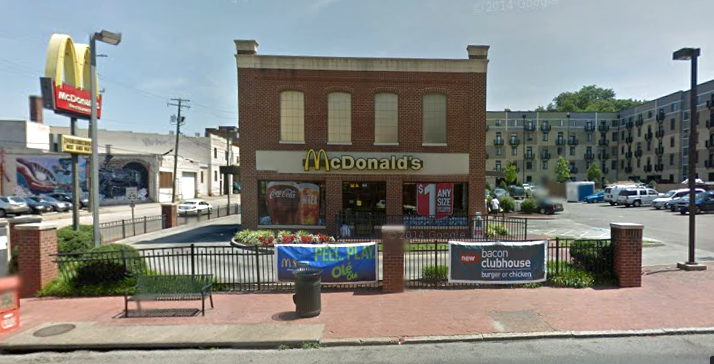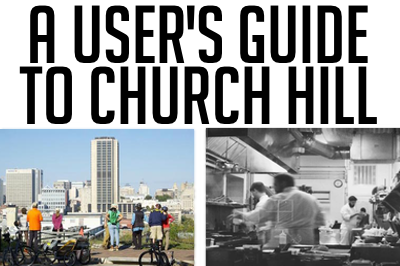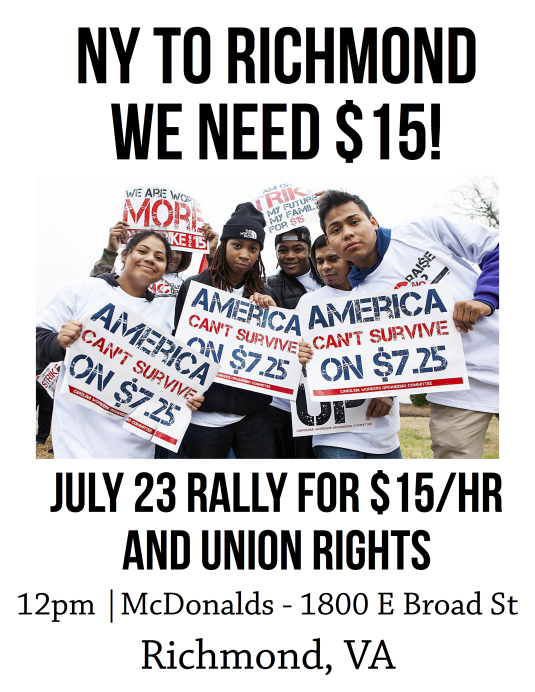RECENT COMMENTS
Joel Cabot on Power Outage on the Hill
Eric S. Huffstutler on What is up with the Church Hill Post Office?
Eric S. Huffstutler on What is up with the Church Hill Post Office?
Yvette Cannon on What is up with the Church Hill Post Office?
crd on Power Outage on the Hill

Rally for $15 minimum wage this Thursday
07/22/2015 7:43 AM by John M
Per Phil Wilayto: There will be a NY to VA: We Need $15! rally this Thursday, July 23 at noon at the McDonald’s at 1800 East Broad Street:
[W]e’ll be rallying in support and solidarity with New York, here in Richmond, VA. So join us as we stand with the workers who started the Fight For $15, and as we gear up for the next big fights in the movement for living wages and union rights for all workers!
— ∮∮∮ —







Hmm…This should be interesting.
Bet you’ll never see a “I will learn the skills and put in the effort needed to earn $15/hr” rally
I guess you would know, Tim. I think this is a terrific idea and I trust this will move us in that direction.
Katmando, I’m guessing that you’ve never taken an economics class.
Tim, Thank goodness you are doing your part to share the skills that earn you more than minimum wage! Where can everyone sign up for your free training sessions????
Guess no one can have a burger Thursday. Also how much an hour are the panhandlers making on that corner?
The fact is, no one who works full-time should be making $15,080/yr. That is what someone who makes minimum wage makes working 40 hours a week, before taxes (because even poor people pay into FICA etc).
But of course, people who get paid minimum wage jobs often aren’t allowed to work more than 30 hours a week at those jobs, because the employer would then be required to provide benefits and time off, etc. So people end up having multiple minimum wage jobs.
Imagine working 60 hours a week and clearing $22,620/yr, with no sick leave, health insurance, paid time off, or control over your schedule. This is the high societal cost of low prices–and please recall that we live in a service economy, folks. These jobs are filled by a huge chunk of the population because our economy is driven by service industries.
Remember that the next time you shop at Wal-Mart or otherwise invest in companies that privilege shareholder profits over everything else.
Why so much negativity here about fast food workers getting paid? Or about them organizing to better their lot?
How does it hurt you if they can make a living?
I hope they succeed. The people I’ve met there are genuinely nice to me. And I’d bet the hamburger cost will still be under a $1.25.
I can’t speak for anyone else but when I was working as a busboy in high school or waited tables in college for $2/hour plus tips, I didn’t picket outside demanding to get paid more. I went out and figured out how to get a better paying job through education, networking, self-improvement, etc. Anybody that demands to get paid more for what they’re currently doing, especially if it’s a skill-less commoditized job is missing the point
I don’t have a strong opinion about raising or lowering the minimum wage, but I think I like the proposals for a higher Earned Income Tax Credit better on the assumption that it would encourage work without reducing hiring/total number of jobs. But if anyone can explain why those assumptions are wrong, I’m not set in that position
Of course you saw where NY is moving to a $15 minimum wage and DC is putting it on the ballot for 2016.
I trust Virginia will join the club like most of America and rally for this so that more people can have a living wage and not be on the verge of disaster 24/7 365.
If we raised wages to $15, what happens to the people who earn $15 or $16 an hour today?
$15 an hour is a nice idea. Of course a few things need to happen.
1. The employer needs to be able to afford to pay you $15 an hour. Remember that the McDonald’s store in Shockoe Bottom isn’t owned by the company on the stock exchange but by a franchisee–a local small business person. The money you want to pay in higher wages comes directly from the franchisee’s pocket. Do you know if the franchisee is making enough to afford to offer it? If not, and you mandate it, then EVERYONE is out of work, and NO ONE is making $15 an hour or ANYTHING.
2. At $15 an hour will people still buy the product at the higher prices that will be required in order to pay the higher wages in many cases? If not, the business closes, and NO ONE makes ANYTHING.
That’s the piece of this equation no one wants to deal with. It’s a lovely idea to say that workers should be paid more. But for small employers–and many McDonald’s franchisees are not rich after they make payroll, pay for their food cost, pay rent, franchise and advertising fees to corporate, pay to make repairs and buy new equipment when corporate on a whim decides to try something new on the menu–McCafe was expensive for many franchisees–and then pay taxes and other government regulatory fees. Never mind the various types of insurance, accounting and legal fees they inevitably incur.
Your wage is determined by the amount of hours you work combined with the demand for the skills you bring to the table. Sometimes those skills just do not justify the payment of $15 an hour. That is not the fault of the employer. You cannot expect someone to pay more for something than it is worthIf you force it, the employer has the option of closing—and may be required to if they cannot make the bottom line work, because someone else decided that everyone’s labor is “worth” at least $15 an hour whether the economics support it or not.
Worse, at $15 an hour, those who cannot perform at a level that justifies the salaries will be replaced by those who do. The marginal worker—the one that can be justified at $8 an hour, but no one will pay $15 to hire—is now unemployable because the economics no longer make sense.
I suspect a number of the small businesses we all like in Church Hill—Sub Rosa, Union Market, Proper Pie and the like—do not pay all of their employees $15 an hour. Before you clamor for this, ask them how a $15 an hour mandate would impact their bottom lines. The owners are not living on River Road in mansions, but here in the neighborhood. Just see what $15 minimum across the board would do to them and if their businesses would continue to operate without a hitch. Because for them, they will either have to cut their own pay—their profits—thereby reducing (and penalizing them for) the value of the effort and investment they have already made, raise prices, or fire people to meet the standard you are setting.
No one wants anyone to live in poverty. But economics can be stubborn too.
Also why $15? Why not $20? Or $25? Since there is no interest in whether or not the wage payer can afford to offer $15, and it’s not your money you are paying in higher wages (it’s always easier to spend other people’s money after all), sky’s the limit, right?
#9: Try again tomorrow. It’s set for the 23rd.
Speaking from experience, it’s possible to be a small business owner and pay employees a living wage–with benefits and time off–and still turn a profit. You just have to want to do it.
And–you’ll end up with loyal employees and minimal turnover, making your company more profitable in the long run.
Bottom line, end of story.
I like the you think #15. I think all of us should go on strike tomorrow and hold out for $500 an hour. No reason we can’t all earn a million a year. Why can’t we all be rich?
great article on FOXNEWS about how the 15$ hour in Seattle doesnt work. It makes things worse because at that annual salary, govt benefits disappear and the person is worse off without them.
“Your wage is determined by the amount of hours you work combined with the demand for the skills you bring to the table. Sometimes those skills just do not justify the payment of $15 an hour.”
BAF took the words out of my mouth, albeit it in a much more eloquent fashion. Working in the fast food industry is for young folks looking to scrape together rent & beer money, while learning some people skills. It is not meant to be a career.
@ 11 & 16 So in other words we should continue to pay people low wages and subsidize those wages with taxpayer money. It seems to be understood that people cannot afford to live off of these wages and government programs make up the difference. So the business gets to pay someone less that a living wage, while getting an employee whose expenses are subsidized by the government. As #14 points out the business may not be able to afford to operate without this assistance. So taxpayers are basically paying to make the franchise owner’s business profitable. As a taxpayer, I would rather see this person have to pay wages that make someone ineligible for government assistance. Paying a little more for an order of fries sounds better to me than having a government subsidized McDonald’s on the corner.
Well said #15.
I flipped burgers in high school. It was a job to build my skills for the next job. I paid for my car and gas money that way. Saved a little for college, too. What was it $3.15/hour?
It was never a career path. Assuming the owner can “afford” the $15, the added benefit may be that it attracts a better employee and the marginal ones that barely have the skill sets to work will lose their jobs.
Here’s the link regarding the issue in Seattle.
http://www.foxnews.com/politics/2015/07/22/seattle-sees-fallout-from-15-minimum-wage-as-other-cities-follow-suit/?intcmp=latestnews
Ah, two references to Faux News. I would have thought We could do better than that. And, I did’t know you fit the demographic.
At the end of the day, this is just a dumb fantasy. Even ignoring second order issues with inflation and rising costs of goods, the math doesn’t work on this.
Your typical McDonald’s franchise costs $1-1.9MM to get in the door. An average franchisee makes somewhere between $50-100K a year on that. Running a store takes something along the lines of 32K hours (assuming 5 person staff, open from 6AM – 12AM, 365 days). Even a one or two dollar raise makes it so the franchisee would make almost nothing on their investment. Nobody would buy a franchise with that kind of return so the jobs would dry up or owners would just figure out how to fire their workers and automate them. The answer never ends up being “everyone who works there now suddenly makes a nice enough wage that they can raise a family on.”
Raising prices isn’t the answer. If McDonald’s thought they could earn more by selling at a higher price, they’d already be doing that.
That said, I agree with the comments that our government subsidizing the franchisees to pay employees less than they need isn’t a fair solution either.
Wouldn’t the McDonalds franchisee be inclined to go find someone that’s making $14/hr somewhere else to fill the new $15/hr position? Maybe someone who has worked their way up to $14/hr at another establishment and has the track record to be an asset at that amount?
It seems we’ve screwed ourselves by waiting until 2015 to catapult the living wage, instead of a gradual rise like it should’ve been.
#17, it may be possible in your business. You don’t mention what you do for a living. If you are in a small law practice, your economics will be different than in a restaurant.
@25. This presumes the person making $14 wants to earn an extra dollar laboring in fast food. They may be earning $14 doing something far less strenuous.
CNN has a story today about McDonald’s quarterly sales falling 10%.
@ Hill Runner – you’re focused a different facet of the problem, the notion that the government is subsidizing workers. I don’t think you’re wrong, but a fair counterpoint is that “we”/society, think that a minimum standard of living for all citizens is desirable. This is a social and not a business idea, so why should businesses (and, indirectly, consumers) pay for it? On the one hand, current government programs may drag down wages or encourage people to work for less, BUT, considering unemployment – by which I mean a realistic assessment that also considers the participation rate as well as the official unemployment rate – I can’t help but suspect that market wages for many positions are naturally at or below the minimum wage regardless of the influence of public assistance.
Obviously figuring out both the bottom line (who actually pays currently, and who would bear the final cost of any change) and the way in which the “moving parts” interact is problematic. I imagine no matter what is done (Minimum wage change, tax/EITC changes, or status quo) there will be unintended consequences.
“HILL RUNNER – 11 & 16 So in other words we should continue to pay people low wages and subsidize those wages with taxpayer money. It seems to be understood that people cannot afford to live off of these wages and government programs make up the difference. So the business gets to pay someone less that a living wage, while getting an employee whose expenses are subsidized by the government. As #14 points out the business may not be able to afford to operate without this assistance. So taxpayers are basically paying to make the franchise owner’s business profitable. As a taxpayer, I would rather see this person have to pay wages that make someone ineligible for government assistance. Paying a little more for an order of fries sounds better to me than having a government subsidized McDonald’s on the corner.”
“Working in the fast food industry is for young folks looking to scrape together rent & beer money, while learning some people skills. It is not meant to be a career.”
Says who?? When did the food and beverage industry become the job of only youngsters looking for chunk change? Because, I see people of ALL ages working these positions everyday, and I’m sure they’re trying to provide their families with more than just beer money. Are these jobs, and the human beings employed in these positions, not to be taken seriously and given respect? Sheesh, I’m getting an odor of classism in this thread.
Says common sense. Call it classism if you want, I call it being a realist. These are jobs which require few, if any skills which is why young folks with little experience gravitate towards them. Basic people skills is most all that is needed, but the few times a year I find myself eating fast food even that seems to be missing. You are worth what someone is willing to pay you. I don’t feel the person flipping burgers deserves to be paid a similar wage to educators or public servants.
The root of the problem is that the fast food business model as it exists today requires cheap labor to function. If we think that’s not an acceptable outcome, we can legislate the business model out of existence by preventing people from running business models that require workers that don’t earn a living wage.
There’s some ugly realities on both sides of the debate – either we continue to use our tax dollars to basically make these business models profitable for their owners (which should be done by the people shopping there) or we effectively shut down the businesses once they can’t make the realities work. The latter might mean people don’t get $15, they get laid off. The money just isn’t there for a vast majority of fast food operations.
By tinkering in the markets, we’ve allowed this arbitrage opportunity to spring up. Additional tinkering is just as likely to do more damage as it is to help. If there were a simple solution, it would have been found by now. Pretending it’s as simple as passing a law and poverty is solved is a gross oversimplification.
@29 You’ve got it backwards–the government isn’t subsidizing workers. They are subsidizing the businesses.
Our tax dollars (in the form of food stamps and other programs meant to help support the working poor) are part of employee compensation.
Why should we essentially be helping to fund payroll for these huge corporations?
http://www.forbes.com/sites/clareoconnor/2014/04/15/report-walmart-workers-cost-taxpayers-6-2-billion-in-public-assistance/
http://www.slate.com/articles/business/moneybox/2014/04/walmart_employees_on_food_stamps_their_wages_aren_t_enough_to_get_by.html
@33 because not every employer is a huge corporation. And that probably includes the franchisee who operates the McDonald’s in Shockoe Bottom. And as we all know many beneficiaries receive those benefits when they don’t have jobs.
@ 33 – I actually meant to write “companies” – but the point is, the intent of the EITC specifically, and several other programs like it, is to help low income people, not to help corporations. Whether it ultimately subsidizes corporations and/or whether it benefits businesses more than individuals seems – absent a ton of additional information – uncertain, and may be a matter of perspective.
The other point I was trying to make was that even if these programs were taken away, the market rate for these individual’s labor might still be below the minimum wage due to the sheer number of people who are not working (I.e. Considering unemployment rate, participation rate, discouraged workers, and so forth). Perhaps the better solution might be a slight increase to both the EITC AND to Minimum wage. If we want people who work to have a decent standard of living, it seems like we have a choice between either fewer people working or more workers receiving government assistance.